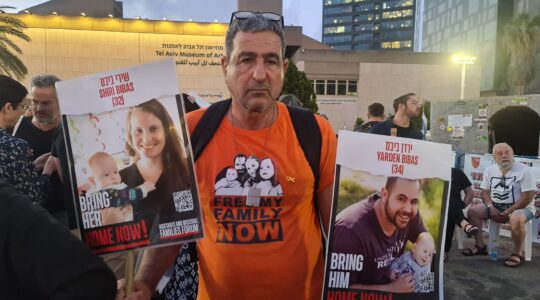TEL AVIV (JTA) – In the eyes of Israeli authorities, Mohammad Allaan was a member of the Islamic Jihad terror group who had attempted to orchestrate a suicide bombing. Many Palestinians, by contrast, saw him as a powerful symbol — a man who staged a 65-day hunger strike to protest his imprisonment without charge.
Allaan, who had already served a three-year sentence about a decade ago, had been held in so-called administrative detention since November, when Israeli officials claimed that he posed an imminent security risk. Then last week, on the heels of a hunger strike that doctors said had caused brain damage, Israel suspended Allaan’s detention.
Israeli Public Security Minister Gilad Erdan said in an Aug. 19 Facebook post that Allaan’s release “is likely to cause mass hunger strikes among the security detainees, after which they will have discovered a new tool by which they can squeeze the state of Israel.”
Some 6,000 Palestinians are in Israeli jails, according to Israel. About 370 of them are administrative detainees who have yet to face charges, the Israeli human rights group B’Tselem reported in June. Many Palestinians in Israeli jails have have been suspected of, charged with or convicted of crimes ranging from being a member of a terrorist group to committing an act of terror, from organizing an illegal demonstration and throwing stones, according to the Israel Defense Forces.
Allaan hails from a Palestinian village near the West Bank city of Nablus.
READ: Israeli doctors refuse to force feed hunger-striking Palestinian prisoner
While not quite a rite of passage — “nobody’s looking to be in prison,” said Bassem Tamimi, a Palestinian who organizes West Bank protests against settlement expansion — jail time has become a common experience for Palestinians.
According to Addameer, a Palestinian legal aid organization for prisoners, some 40 percent of Palestinian men have served time. Tamimi, for one, has been arrested nine times, and at one point spent 13 months in jail.
The Palestinian Authority’s Ministry of Prisoners’ Affairs provides monthly stipends to some inmates. Released Palestinian prisoners have been welcomed as heroes upon their return to the West Bank or Gaza. Prisoners whose release was set as a precondition for 2013’s Israeli-Palestinian peace talks, for example, were greeted with cheers, songs and celebrations.
“In the end of the day, everyone has one family member,” said Sahar Francis, the director of Addameer. “You won’t find any Palestinian house where they won’t have a prisoner.”
When the United States proposed a prisoner release in exchange for an extension of Israeli-Palestinian peace talks in April 2014, nearly two-thirds of Palestinians supported the offer, according to the Palestinian Center for Policy and Research. Meanwhile, some 85 percent of Israelis had opposed a prisoner release as a condition to begin the peace talks in 2013, the Israeli daily Israel Hayom reported.
Unlike Israeli citizens tried in Israeli civilian courts, Palestinians in the West Bank arrested by the IDF or the Shin Bet intelligence agency are tried in a military court.
READ: Palestinians mark Prisoners’ Day with hunger strikes, protests
An IDF source with knowledge of the military legal system said the procedures are not all that different from an Israeli civilian court, and that Palestinians are accorded rights comparable to suspects in any Western country. They have the right to an attorney, and the prosecution must present evidence to support a conviction based on the violation of a law.
Administrative detention is only used for “people who pose an imminent danger of one kind or another to the security of the region, and takes them off the street,” said the source, who remained anonymous due to IDF protocol.
But Palestinians and their Israeli advocates say that the military courts are fundamentally different from the civilian system, and they employ harsher interrogation techniques. Detained Palestinians also face longer waits for judicial hearings, the advocates say. (Palestinians may wait up to four days for a hearing; Israelis in civilian court wait up to 24 hours before being arraigned.)
According to the IDF official, two-thirds of cases brought to the court result in an indictment, and 99 percent of indicted defendants are convicted on at least one count.
“It’s not a court system created by the people for the people,” B’Tselem spokeswoman Sarit Michaeli said. “It’s a court system imposed on a Palestinian population.”
Tamimi said hunger strikes are seen as an effective method because prisoners feel they have no recourse in the Israeli system.
“It’s the only tool,” he said. “Sometimes you accept harm to the body. [Allaan] protected his dignity and freedom.”
JTA has documented Jewish history in real-time for over a century. Keep our journalism strong by joining us in supporting independent, award-winning reporting.






